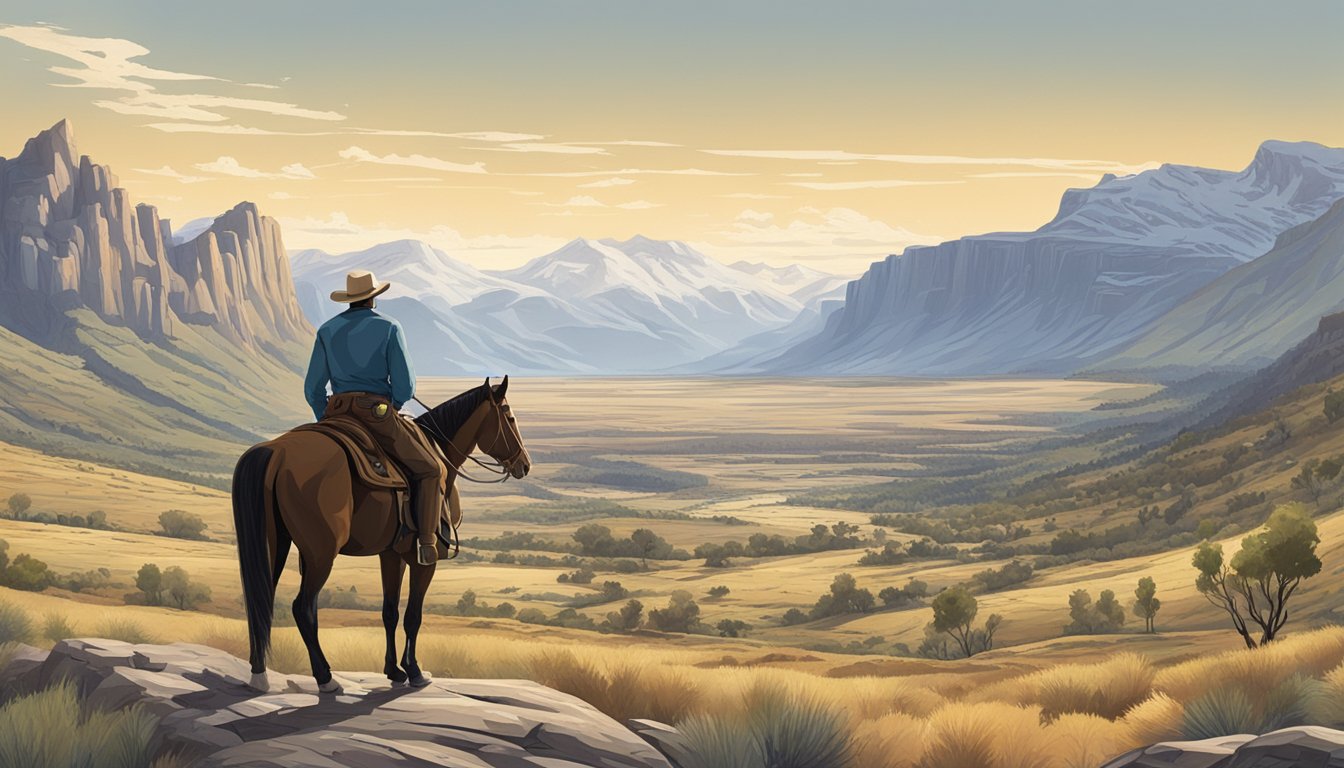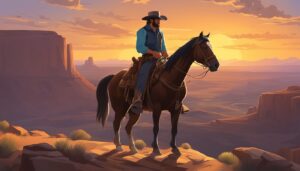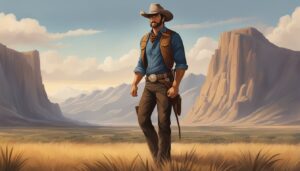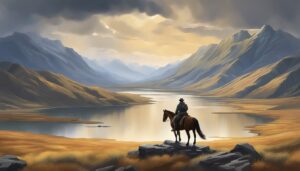Western dramas have captivated audiences for decades, showcasing rugged heroes who embody the spirit of the American frontier. Two iconic characters that stand out are John Dutton from the modern neo-western “Yellowstone” and Lucas McCain from the classic series “The Rifleman.” Both men are strong-willed ranchers and devoted fathers, but they face vastly different challenges in their respective eras.
John Dutton, portrayed by Kevin Costner and Josh Lucas in flashbacks, is the patriarch of the largest ranch in the United States. He navigates complex political landscapes and family dynamics in a contemporary setting. Lucas McCain, played by Chuck Connors, is a widowed rancher in 1880s New Mexico Territory who raises his son while protecting his community. Both characters are impressive in their own right, but John Dutton’s ability to adapt to modern complexities while maintaining traditional values gives him a slight edge in terms of overall impact and relevance to today’s audiences.
These characters represent different facets of the Western hero archetype, with Dutton embodying the evolution of the cowboy in a changing world, while McCain represents the more traditional, straightforward hero of classic Westerns. Their stories offer unique perspectives on leadership, family, and the enduring spirit of the American West.
Historical Context of Westerns

Western films and television shows have captivated audiences for decades, evolving alongside American cultural values and societal shifts. This genre has deep roots in American history and continues to shape popular entertainment.
The Evolution of the Western Genre
The Western genre emerged in the early 20th century, reflecting America’s fascination with frontier life. Silent films like “The Great Train Robbery” (1903) laid the groundwork for the genre’s popularity. As Hollywood developed, Westerns became a staple, with icons like John Wayne and Clint Eastwood defining the archetypal cowboy hero.
The 1950s and 60s saw the genre’s golden age on television. Shows like “Gunsmoke” and “Bonanza” brought Western stories into homes across America. These productions often romanticized the Old West, emphasizing themes of justice, honor, and rugged individualism.
Significant Westerns: From 1883 to Modern Portrayals
Recent years have seen a resurgence of Western-themed content, with a focus on historical accuracy and complex characters. The series “1883” serves as a prequel to “Yellowstone,” exploring the Dutton family’s 19th-century origins. This show blends traditional Western elements with a gritty, realistic portrayal of frontier life.
“1923” continues the Dutton saga, bridging the gap between “1883” and modern-day “Yellowstone.” These productions showcase the genre’s adaptability, incorporating contemporary storytelling techniques while maintaining core Western themes. Modern Westerns often tackle complex issues, presenting morally ambiguous characters and exploring the darker aspects of American history.
Key Contributors to the Genre

Taylor Sheridan and Paramount Network have played crucial roles in revitalizing the Western genre for modern audiences. Their collaboration on Yellowstone has set new standards for contemporary Western dramas.
Influence of Taylor Sheridan’s Writing
Taylor Sheridan’s writing has breathed new life into the Western genre. His approach blends traditional Western themes with contemporary issues, creating a unique narrative style. Sheridan’s work on Yellowstone showcases complex characters and intricate plotlines that resonate with today’s viewers.
Paramount Network took a chance on Sheridan’s vision, greenlit the project in 2017. This decision proved pivotal in bringing a fresh perspective to Western storytelling. Sheridan’s scripts explore timeless themes like family loyalty, land disputes, and the changing American West.
His writing delves into moral ambiguity, particularly evident in the character of John Dutton. This complexity adds depth to the show’s protagonists, moving beyond simple hero archetypes. Sheridan’s storytelling has attracted both critical acclaim and a dedicated fanbase.
Character Analysis
John Dutton and Lucas McCain represent contrasting approaches to heroism in Western narratives. Their character traits and moral compasses shape their roles as protagonists in their respective series.
John Dutton: A Complex Protagonist
John Dutton embodies the modern antihero archetype. As the patriarch of Yellowstone Ranch, he fiercely protects his family’s legacy through morally ambiguous means.
Dutton’s unwavering dedication to preserving his land often leads to ruthless decisions. His actions blur the line between hero and villain, creating a complex character that captivates audiences.
Despite his flaws, John’s charisma and strong sense of duty make him compelling. He struggles with the weight of tradition and the changing landscape of the American West.
Dutton’s character depth comes from his internal conflicts. He grapples with maintaining power while upholding family values, creating a multifaceted protagonist.
Lucas McCain: The Rifleman’s Moral Compass
Lucas McCain represents a more traditional Western hero. As a widowed rancher raising his son alone, McCain embodies strong moral values and a clear sense of right and wrong.
Known for his exceptional marksmanship, McCain uses his skills to uphold justice rather than for personal gain. His character is defined by integrity, compassion, and a steadfast commitment to protecting the innocent.
McCain’s role as a single father adds depth to his character. He balances his duties as a rancher and lawman with the responsibilities of parenthood, showcasing a nurturing side rarely seen in Western protagonists.
Unlike Dutton, McCain’s moral decisions are rarely ambiguous. He serves as a role model for his son and community, embodying the ideals of honor and fairness in the Old West.
Dutton Family and Yellowstone Ranch Dynamics

The Dutton family’s grip on their vast Montana ranch forms the core of Yellowstone’s captivating narrative. Their complex relationships and unwavering loyalty to the land drive the show’s most compelling storylines.
Family Legacy and its Impact
John Dutton III leads the Dutton clan with fierce determination to preserve their ancestral lands. His children – Beth, Kayce, and Jamie – each play crucial roles in maintaining the family’s power and influence. The weight of this legacy shapes their decisions and often pits them against external threats.
Beth’s sharp business acumen and Kayce’s military background prove invaluable in protecting Dutton interests. Jamie’s legal expertise, though sometimes at odds with family goals, adds another layer of defense.
The youngest generation, including Tate and Carter, represents the future of the Dutton legacy. Their presence raises stakes for the family’s ongoing struggles.
Ranch Life: The Center of Conflict and Loyalty
Yellowstone Ranch serves as both haven and battleground for the Duttons. Daily operations require grit and skill from family members and loyal workers like Rip Wheeler.
The ranch’s vast acreage attracts constant threats:
- Land developers
- Native American tribes reclaiming territory
- Government agencies
These conflicts test the Duttons’ resolve and often lead to morally ambiguous decisions. The family’s commitment to their way of life frequently clashes with modern realities and changing societal norms.
Dramatic Relationships within the Dutton Family
Intense loyalties and bitter rivalries define the Dutton family dynamic. John’s complicated relationships with his children drive much of the show’s drama.
Beth’s fierce protectiveness of her father contrasts sharply with Jamie’s quest for independence. Kayce struggles to balance his duties to the ranch with his commitment to wife Monica and their son Tate.
Rip Wheeler, though not blood-related, has earned his place as John’s most trusted ally. His romance with Beth adds another layer of complexity to the family structure.
These intricate bonds create a web of alliances and conflicts that keep viewers invested in the Duttons’ fate.
Setting and Sociopolitical Themes
Yellowstone’s Montana backdrop and complex sociopolitical dynamics set the stage for John Dutton’s struggles. The show explores themes of justice, power, and conflicting land claims against a rugged Western landscape.
Montana’s Majesty and Ruggedness
Montana’s vast, untamed wilderness serves as a stunning backdrop for Yellowstone. The show captures the state’s natural beauty through sweeping vistas of mountains, forests, and prairies. This rugged terrain shapes the characters’ lives and livelihoods.
The Dutton ranch, spanning thousands of acres, represents the last vestiges of the Old West. It stands in stark contrast to encroaching modernization and development. The harsh climate and isolated location create unique challenges for the Dutton family and their ranch hands.
Montana’s natural resources, including oil and minerals, play a crucial role in the show’s conflicts. These assets attract outside interests and fuel political rivalries.
Theme of Justice and Political Power
Justice and political power intertwine throughout Yellowstone’s narrative. John Dutton wields significant influence as a prominent landowner and former livestock commissioner. His connections extend to local law enforcement and state government.
The show explores the blurred lines between legal authority and personal vendettas. Characters often take justice into their own hands, bypassing official channels. This vigilantism raises questions about the nature of law and order in modern Montana.
Political maneuvering is a constant undercurrent. The governor’s office becomes a battleground for competing interests. Alliances shift as characters vie for control over land, resources, and policy decisions.
Conflict with Land Developers and Native Claims
Land disputes form the core of Yellowstone’s conflicts. The Dutton ranch faces threats from developers seeking to build casinos, ski resorts, and luxury homes. These outsiders represent a changing West, driven by tourism and urban expansion.
Chief Thomas Rainwater of the Broken Rock Indian Reservation emerges as a formidable opponent. He seeks to reclaim ancestral lands, challenging the Duttons’ historical claim to the territory. This storyline highlights the complex legacy of Native American displacement.
The clash between tradition and progress plays out through zoning battles, legal challenges, and sometimes violent confrontations. Each faction believes they have a rightful claim to the land, creating a web of competing interests and moral ambiguities.
Comparative Narrative and Style

Yellowstone and The Rifleman employ distinct storytelling approaches and visual techniques to bring their Western narratives to life. These shows, while set in different eras, showcase unique methods of character development and world-building.
Storytelling Techniques in Yellowstone vs The Rifleman
Yellowstone adopts a complex, multi-layered narrative structure. The show weaves together numerous plotlines involving the Dutton family’s struggles to maintain their ranch. It incorporates political intrigue, corporate conflicts, and family drama.
The Rifleman, in contrast, follows a more episodic format. Each episode typically presents a self-contained story centered around Lucas McCain and his son Mark. The show often tackles moral dilemmas and frontier justice.
Yellowstone’s characters exhibit moral ambiguity, with protagonists often making questionable choices. The Rifleman portrays Lucas McCain as a clear-cut hero, embodying traditional Western values.
Cinematography and Symbolism
Yellowstone capitalizes on modern cinematography techniques to capture the vast Montana landscape. Wide-angle shots emphasize the ranch’s expansive territory, symbolizing the Duttons’ power and influence.
The show uses natural lighting and muted color palettes to create a gritty, realistic atmosphere. This visual style reflects the harsh realities of modern ranching life.
The Rifleman, filmed in black and white, relies on classic Western imagery. It features iconic shots of dusty streets and saloon standoffs. The show’s opening sequence, showcasing McCain’s rapid-fire rifle technique, became a symbol of the protagonist’s skill and righteousness.
Both series use visual motifs to reinforce themes. Yellowstone employs recurring images of branded cattle to represent ownership and legacy. The Rifleman features McCain’s modified Winchester rifle as a symbol of protection and justice.
Influence and Cultural Impact

John Dutton and Lucas McCain have both left indelible marks on Western television. Their characters have shaped audience perceptions and spawned new content within their respective franchises.
Audience Reception and Critique
John Dutton’s character in Yellowstone has garnered widespread acclaim. Viewers praise Kevin Costner’s nuanced portrayal of the complex rancher and patriarch. The show’s authentic depiction of modern ranch life resonates with many Americans.
Critics laud Yellowstone’s exploration of land rights, family dynamics, and political intrigue. The series has sparked discussions about conservation and indigenous issues.
Lucas McCain, while from an earlier era, also earned a devoted following. His image as a single father and skilled marksman appealed to 1950s audiences. The Rifleman tackled moral dilemmas, making it stand out among Westerns of its time.
The Ripple Effect: Spinoff Series and Expansions
Yellowstone’s success has led to a rapidly expanding franchise. Paramount+ has capitalized on the show’s popularity with multiple spinoffs and prequels.
Notable expansions include:
- “1883”: A prequel exploring the Dutton family’s origins
- “1923”: Another prequel starring Harrison Ford and Helen Mirren
- “6666”: A spinoff set on the Four Sixes Ranch in Texas
These series delve deeper into the Dutton family history and the broader world of ranching. They attract both existing fans and new viewers to the Yellowstone universe.
The Rifleman, while not spawning direct spinoffs, influenced later Western shows. Its focus on familial relationships and moral lessons paved the way for more character-driven Westerns.
Personal Attributes and Growth

John Dutton and Lucas McCain possess distinct personal qualities that define their characters. Their journeys showcase profound growth, loyalty, and compassion as they navigate complex relationships and challenges.
Exploring Themes of Loyalty and Compassion
John Dutton’s unwavering loyalty to his family and ranch is a cornerstone of his character. He fiercely protects his legacy, often at great personal cost. This dedication extends to his ranch hands, whom he treats as family.
Lucas McCain’s loyalty manifests differently. As a single father, his devotion to his son Mark is paramount. He balances this with a strong sense of civic duty to North Fork.
Both men exhibit compassion, though in contrasting ways. Dutton’s compassion is often masked by his gruff exterior but surfaces in moments of crisis. McCain’s compassion is more overt, regularly helping townspeople and strangers alike.
Character Development and Resilience
John Dutton’s character evolves throughout Yellowstone. Initially portrayed as a ruthless rancher, he gradually reveals deeper layers of vulnerability. His relationships, particularly with Beth and Kayce, showcase his capacity for growth.
Lucas McCain’s development is rooted in his past as a Union soldier. This experience shapes his approach to conflict resolution and justice. His resilience is evident in how he raises his son alone while facing numerous challenges.
Both characters demonstrate remarkable resilience. Dutton faces threats to his land and family with unwavering determination. McCain consistently overcomes adversity, using his quick wit and sharpshooting skills to protect his community.
Their legacies differ significantly. Dutton’s focus is on preserving his family’s ranch for future generations. McCain’s legacy is more immediate, centered on raising his son to be a good man and maintaining peace in North Fork.
Casting and Performance

The casting choices and performances in Yellowstone and The Rifleman played crucial roles in bringing these Western heroes to life. Both shows feature strong leading actors and talented supporting casts that contribute to their success.
Leading Roles: Kevin Costner and Chuck Connors
Kevin Costner embodies John Dutton in Yellowstone with a commanding presence. His portrayal of the rugged patriarch showcases a blend of strength and vulnerability. Costner’s extensive experience in Western films lends authenticity to his performance.
Chuck Connors brought a different energy to Lucas McCain in The Rifleman. His tall stature and quick-draw skills made him a convincing frontier hero. Connors’ background as a professional athlete added physicality to his portrayal.
Both actors infuse their characters with depth and complexity, making them relatable to audiences despite their larger-than-life personas.
Supporting Cast Contributions
Yellowstone’s ensemble cast enhances the show’s dynamic. Kelly Reilly shines as Beth Dutton, John’s fiercely loyal daughter. Wes Bentley portrays Jamie Dutton with nuanced complexity. Cole Hauser’s Rip Wheeler adds grit and intensity to the ranch’s operations.
Kelsey Asbille brings depth to Monica Long Dutton, offering a perspective from outside the core Dutton family. These performances create a rich tapestry of characters that complement Costner’s central role.
The Rifleman featured a smaller recurring cast, with Johnny Crawford as Mark McCain, Lucas’ son. Their father-son relationship formed the emotional core of the series, balancing out the action-packed plotlines.
Conclusion

John Dutton and Lucas McCain stand as iconic Western heroes, each impressive in their own right. Dutton’s modern-day rancher battles corporate interests and political machinations to preserve his family’s legacy. McCain’s 19th-century sharpshooter upholds justice in a lawless frontier town.
Both characters embody core Western values of independence, duty, and protection of family and community. Their unwavering resolve in the face of adversity resonates with audiences across generations.
Dutton’s complex moral choices in a changing world offer thought-provoking drama. McCain’s straightforward approach to right and wrong provides satisfying resolutions to episodic conflicts.
Ultimately, determining which hero is more impressive comes down to personal preference. Fans of gritty contemporary stories may gravitate towards Dutton. Those who enjoy classic Western tropes might find McCain more appealing.
Both characters have left an indelible mark on the Western genre. Their enduring popularity speaks to the timeless appeal of strong, principled protagonists defending their way of life against external threats.



